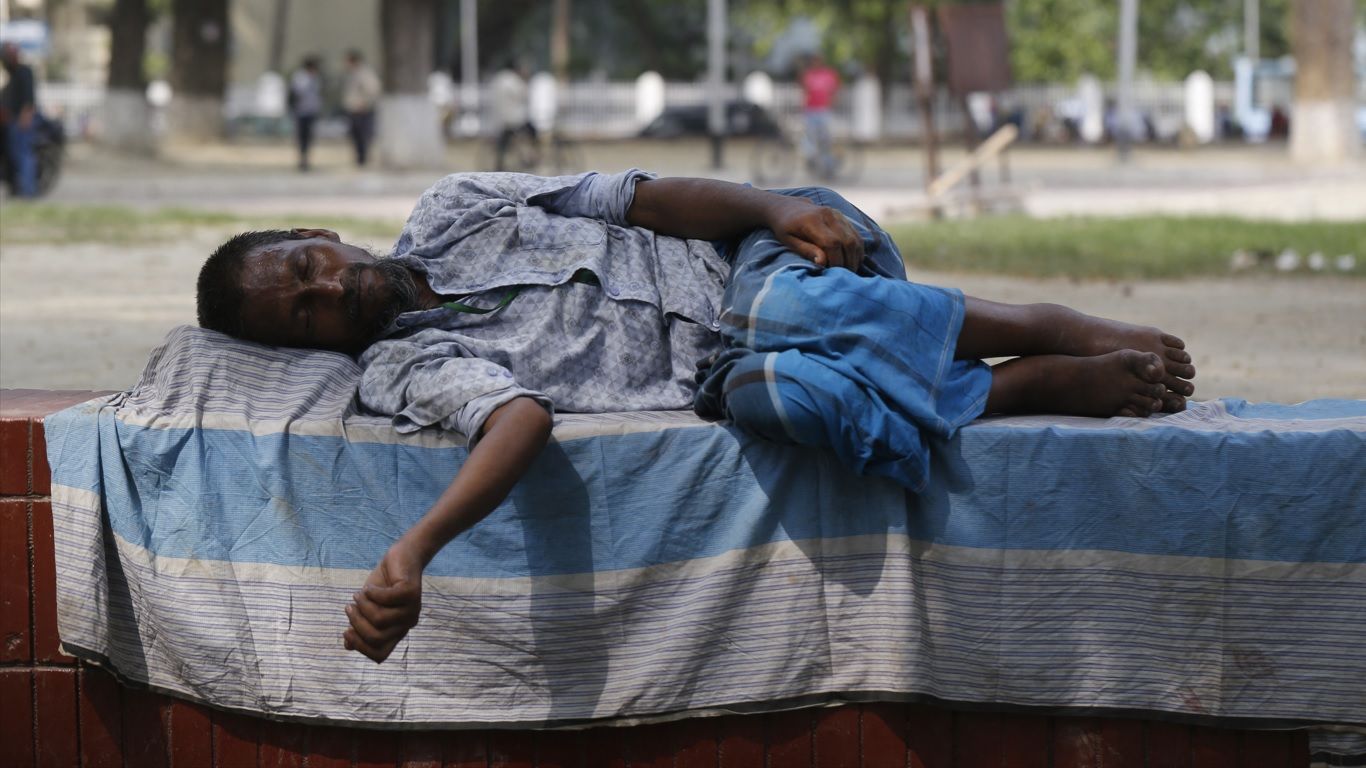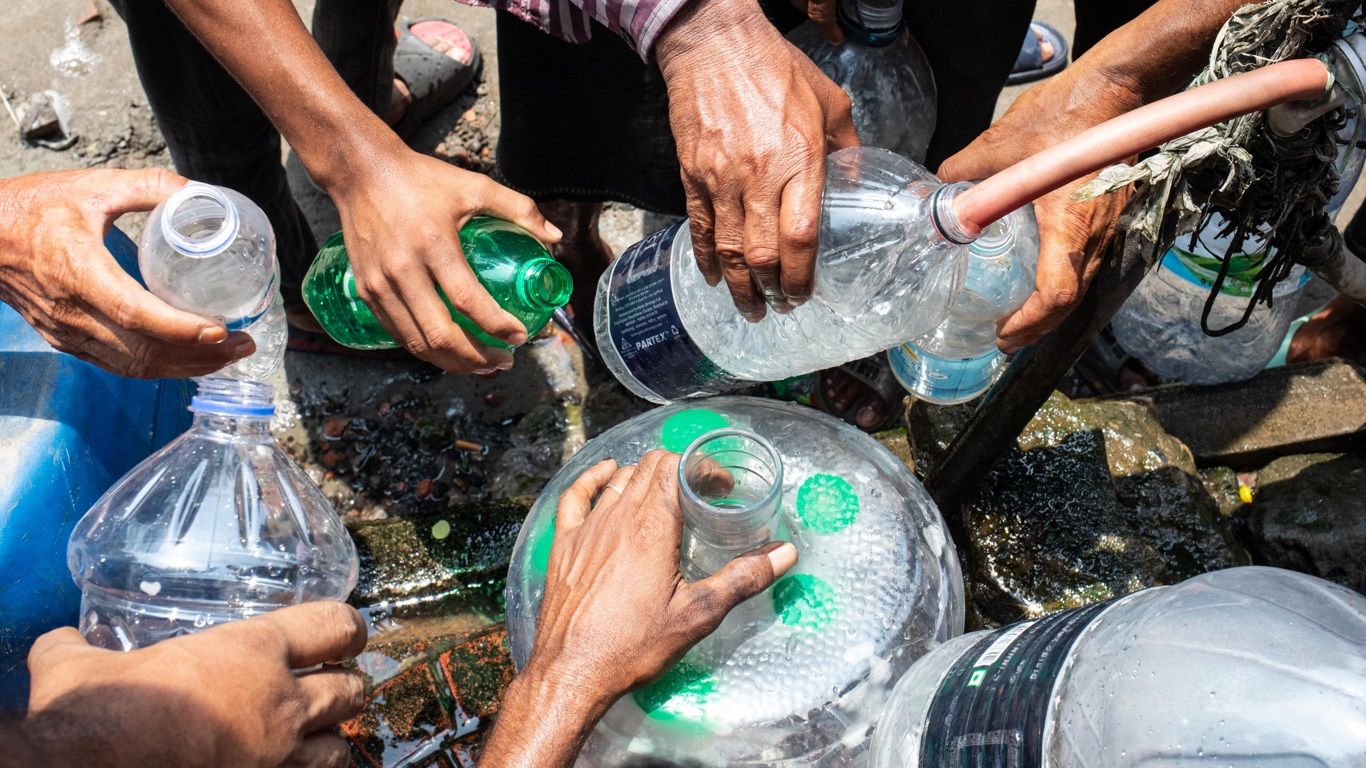A major heat wave hits several countries in South and Southeast Asia. Extreme temperatures above 50ºC cause lack of energy, suspend classes and cause health problems. In Bangladesh (photo), residents describe the heat as unbearable this year. | REHMAN ASAD/NURPHOTO/AFP/METSUL METEOROLOGIA
Millions of people across South and Southeast Asia are facing a powerful heat wave with temperatures well above the historical average. High temperatures punish countries such as India, Myanmar, Bangladesh, Thailand, Philippines, Malaysia and China, among others, causing suspension of activities and interruption of classes.
An Indian minister blamed the heat after collapsing during an election campaign speech, while the country’s meteorological service predicted severe heat wave conditions in nine eastern and southern states in the coming days. Even in mountainous Nepal, health warnings were issued and hospitals were alerted on Thursday as temperatures soared across the southern plains.
Bangkok city authorities have issued an extreme heat warning as the heat index is expected to rise above 52C. Temperatures in the Thai capital reached 40.1°C. The heat index, which is a measure of how the temperature feels taking into account humidity, wind speed and other factors, reached an “extremely dangerous” level in Bangkok.
Authorities in Udon Thani province, in the kingdom’s rural northeast, also warned of scorching temperatures. The Thai Health Ministry said on Wednesday that 30 people died from heatstroke between Jan. 1 and April 17, compared with 37 for all of 2023.
Direk Khampaen, deputy director-general of Thailand’s Department of Disease Control, said authorities are urging elderly people and those with medical conditions including obesity to stay indoors and drink water regularly.
The Philippines’ state meteorological service said the heat index in 38 cities and municipalities, including Manila, was in the “danger zone” on Thursday, with wind chills of 40C to 50C.
In India, Roads Minister Nitin Gadkari fainted during a speech on Wednesday while campaigning for re-election under Prime Minister Narendra Modi’s government. The Electoral Commission said this week it was reviewing the impact of heatwaves and humidity before each round of voting, with an eye on “mitigation measures” that would still allow people to vote.
Heat in Hyderabad, India, where high temperatures punish several states. Extensive scientific research has found that climate change is causing heatwaves to become longer, more frequent and more intense in the country in recent years. | NOAH SEELAM/AFP/METSUL METEOROLOGY
In Nepal, temperatures were forecast to rise above 40°C in two southern provinces, and the government ordered authorities to prepare. Krishna Kumar Gupta, an official in the southern province of Lumbini, reported that incidents of forest fires have also increased. “Yesterday it was 43 degrees Celsius and people also started to feel sick. We are receiving complaints of diarrhea, dehydration and headaches,” he said.
April is typically the hottest month of the year in Thailand and other Southeast Asian countries, but conditions this year have been exacerbated by the El Niño weather pattern. There were record levels of heat stress across the world last year, with the United Nations weather and climate agency saying Asia was warming at a particularly fast rate.
Thailand recorded a temperature of 44.2°C in northern Lampang province on Monday, almost reaching the all-time national record of 44.6°C recorded last year. Across the border in Myanmar, the temperature reached a staggering 45.9°C on Wednesday.
The chaos and conflict triggered by the 2021 military coup led to power cuts across much of the country, hampering people’s ability to stay cool with fans and air conditioning. Several parts of Myanmar were without power as a result of the high temperatures.
Millions of students have been told to stay home this week in Bangladesh as the South Asian nation battles one of the worst heatwaves on record, with temperatures well above normal. Few schools in the capital, Dhaka, have air conditioning, and trying to conduct classes would be futile.

A man rests during the intense heat wave in Dhaka, Bangladesh, where authorities warn of the danger of high temperatures | REHMAN ASAD/NURPHOTO/AFP/METSUL METEOROLOGIA
But the government’s decision to close schools brought no relief to 13-year-old Nur. His cramped one-room house in the megacity, shared with his younger brother and parents, feels almost as suffocating as the streets outside. “The heat is intolerable. Our school is closed, but I can’t study at home. The electric fan doesn’t cool us down,” she told AFP. “When the power went out for an hour or two, it was terrible.”
Nur’s mother, Rumana Islam, was lying in a corner of her home after a sleepless night, covered in sweat after cooking for her family. “Last year was hot, but this year is very hot – more than ever. Just unbearable,” she said. “In the villages, you can go out and cool off under the shade of the trees. “Some breeze comes from the farmland. But here in Dhaka, all you can do is stay at home.”

Pedestrians and workers vie for water to quench their thirst in the scorching heat in Dhaka, Bangladesh. The Bangladesh Meteorological Department (BMD) has issued a warning that the ongoing heat wave is likely to persist for days. | RAKIBUL HASAN/NURPHOTO/AFP/METSUL METEOROLOGY
Temperatures across the country exceeded 42°C last week. The heat prompted thousands to gather in urban mosques and rural fields, praying for relief from the scorching heat that forecasters expect to continue. Bangladeshi authorities hope to reopen schools from April 28, before temperatures begin to drop.
The heat caused an outbreak of diarrhea in the south of the country, due to higher temperatures and increased salinity in local water sources. Around the building where Nur’s family lives, alongside dozens of other low-income families, adults tried to block out the worst of the heat by dozing fitfully in their homes during the afternoon.
“The heat is so intense that it is difficult to drive in these conditions,” said Mohammad Yusuf, 40, who, like Nur’s father and many of his neighbors, makes a living as a driver. “You can get some relief when the air conditioning is on,” he said. “But when you’re outside, it feels like it’s burning.” (With information from AFP)
MetSul Meteorologia is on WhatsApp channels. Subscribe here to access the channel in the messaging app and receive forecasts, alerts and information about the most important events in the weather and climate in Brazil and around the world, with exclusive data and information from our team of meteorologists.









